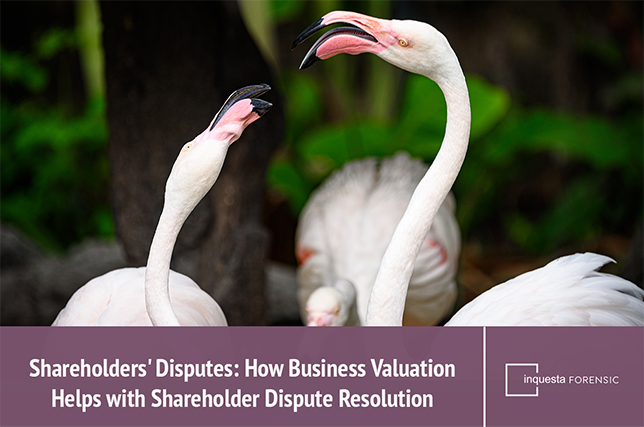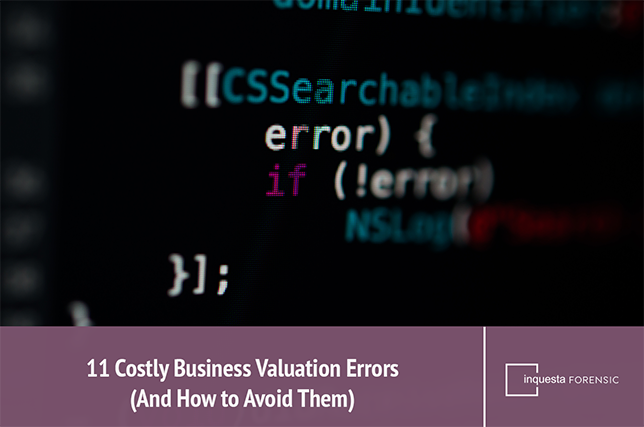The Cost-of-Living Crisis has left millions around the world struggling to make ends meet. People are unable to afford to eat, heat their homes, and support themselves or their families. Similarly, a huge number of companies are also struggling to stay afloat — with costs rising all the time and the financial pressures tightening all the time, disputes between shareholders can be expected.
Disputes between shareholders are difficult to handle and resolve at the best of times, but they can balloon and exacerbate during times when the shared company is under some form of financial stress. A business valuation can be an ideal tool to help you take stock of your position and plan appropriately. Find out more about business valuation in the time of the cost-of-living crisis in the UK and what it can do to help you get to the bottom of an awkward time.

What is The Cost of Living Crisis?
The Cost-of-Living Crisis in the UK refers to the significant fall in disposable income experienced in Britain and around the world. This crisis is widely considered to have been caused by a significant rise in inflation, which outgrew the increase in wages and benefits, and caused a massive boost in the price of many goods and services.
The target set out for inflation stands at around 2%. However, the inflation rate in December 2022 stood at over 10.5%. Another huge contributing factor in the 2022 Cost-of-Living Crisis has been the unprecedented rise in energy prices. Energy bills have, for some, increased by up to 80%
Causes cited for this surge in energy prices include:
- Increased demand
- A limited supply
- Shortages of storage space
- The Russia/Ukraine conflict
What is The Cost of Living Crisis’ Effect on Business?
The impact of the cost-of-living crisis on UK households has been widely reported. However, the effect it has had behind the scenes at many British companies is, in some cases, just as stark. Serious financial difficulties can cause cracks to form in even the strongest of partnerships. Disputes can lead to disruption, additional expense, or even needing a new director.
If two partners have been together for many years, working dusk ‘til dawn night after night to make their dreams a reality, should the business, due to outside factors such as the cost-of-living crisis in the UK, be faced with an overwhelming fear of closure cracks can form between even the closest of friends and measures may need to be taken to ensure the long-term health of the company will not be affected.
The Crisis’ effect on business owners is leading to significant uncertainty. The fear for many is that unless a solution is found soon, no matter what industry you’re in, no matter how seemingly successful you have been, the ongoing hardship could leave a significant and long-lasting impact — if not a terminal one — on not just your business, but your relationships.
Many business director’s in this position find themselves scrambling, panicking in pursuit of something to change their fortunes. This can leave the company vulnerable. However, undertaking a business valuation can allow you to take a step back, to assess your current situation in order to better determine what can be done going forward.
What is Business Valuation?
Business valuation is the formal process of determining the value of your company. In order to come to this conclusion, all areas, aspects, and branches of a business are assessed in order to determine their worth to the company as a whole.
Common reasons for undertaking a business valuation can include:
- Get a Price Tag: If you’re seeking to sell all or part of your company for any reason, having a price in mind based on tangible evidence can be important.
- Find Funding: A business valuation can provide any potential investors with an estimate of the value of your company, and of certain aspects.
- Financial Health: Conducting a business valuation allows you to obtain a clear overview of the overall financial health of your company.
- Assess Performance: By working out which aspects of your company are the highest performers, it’s easier to isolate which ones are underperforming.
- Shareholder dispute: Where there is a disagreement between shareholders and either one wants to exit, or push out a fellow shareholder.
- Divorce Proceedings: When times are tough, it’s possible for fractures to emerge in relationships. In which case, if a marriage passes its breaking point and one or both parties own a company, a business valuation can help to ensure that both sides are able to get a fair share.
Why is Business Valuation Important?
Business valuation is a procedure that a company owner can undertake that provides them with facts and data regarding the worth of their business, with relation to market figures, the value of assets, and income. This knowledge can allow for more informed decisions, as well as better planning for the future, no matter what might happen.
It is recommended that you consider valuing your company regularly. This allows you, as business owner/director, to keep track of your growth and ensure that everything is moving in the right direction.
Reasons why business valuation is important can include the following:
Increased Knowledge of Every Part of Your Company
In business, it’s important to have all possible answers ready for when disaster strikes. If you’re staring down the barrel of financial disaster, you will want to know exactly what is and is not working in your business. You don’t want to be left scrambling for answers when the grip tightens.
Having precise knowledge of your company’s financial situation can be vital for getting the most beneficial insurance terms possible. It can also highlight if and when investment is needed, and how much you would be able to make from selling the company.
Understand Your Firm’s Value
For anybody seeking to sell their company, it’s vital that you know its true value. If you are under the belief that a sale may be in your best interests or is likely to be in your future, it is imperative that you contact a specialist and conduct a thorough business valuation as soon as possible.
The sooner you ascertain the true value of your business, the more opportunity you have to maximise your sale potential. Ultimately, as a company owner, it is important that you have at least a firm idea of your business’s value at any given time.
Attract Investment
Whether you’re looking to find a new investor so one director can step away, you’re hoping to grow your business, or you intend to find a way of saving it from a financial disaster caused by the ongoing Cost-of-Living Crisis, any investor is going to need to see a comprehensive valuation report before committing any funds.
Investors will want to be able to see exactly where their money is going, and how it will be used to both support the business and provide a future return on the investment. If you can show potential investors that their injection of funds can take the business on to the next level, then you’re far more likely to seal a deal.
Better Negotiate Merger/Acquisition
If times are tough and you find an escape route via a possible merger/acquisition then time could be of the essence. In this circumstance, you need to be able to show exactly what the value of the business is as a whole, its growth history, growth potential, and more — particularly if you want to raise as much money from the deal as possible.
Benefits of Business Valuation During Cost of Living Crisis In The UK
A business struggling under the weight of rising costs caused by the Cost-of-Living Crisis will only have a handful of options, including relying on government support to stick it out, closing the company, or seeking outside investment. If the latter is seen to be the most attractive option, then a business valuation is vital.
An investor is unlikely to put large amounts of funds into a company that is losing money, at least not without directors providing key data to support their case and make the prospect as attractive as possible.
The best way to see the position of a potential investor is to put yourself in their shoes. At face value, would you purchase a business that is currently losing money and is set to make a loss for the fiscal year? Unless you had data and evidence to show that this financial difficulty is a direct result of The Cost-of-Living Crisis or other outside factors, you likely wouldn’t want to commit — so why would they?
If your company is in a position where it needs investment, then it is important that you can show:
- Why the business is currently losing money
- How long the company has faced financial difficulties
- What state the finances are in
- What it would take to become financially viable again
How to Do a Business Valuation
If you want to know how to do a business valuation, it’s important to do your research. There are four common methods when valuing your company (assets, earnings, market value, and future earnings), and each looks at different aspects of your business. These methods can be interchanged and utilised alongside each other to provide an all-encompassing look at your finances.
The four common methods of how to do a business valuation are:
- Asset Valuation: Looking at the Fair Market Value and Net Asset Value of your firm’s assets can give you an insight into your value. Company liabilities-assets=business value.
- Earnings Method: Examining the return on investment that a purchaser would receive, by capitalising the estimated future cash flows.
- Market Value Method: This method posits that if you look at sale prices of similarly sized firm’s in the same industry, you can get an idea of the value
If you want to determine how best to do a business valuation for your company, there is no one definitive answer. It is recommended that you contact an expert who can advise you on the best next steps.
How Our Experienced Forensic Accountants Can Help Value Your Business
If the pressure of the cost of living crisis has left the relationship with fellow directors within your business strained and beyond saving, it’s important that you have an understanding of what the best next steps are, for both you and the company.
The last thing anybody wants is for the parting of two (or more)directors to noticeably disrupt operations and impact the success and long-term health of the business.
Therefore, before you get started down the road of a business valuation, it’s vital that you understand how best to proceed. Inquesta’s forensic accounting service is designed to assist you in any way possible. Our forensic accountants are experts with decades of experience supporting businesses of all shapes, sizes, and industries.
Learn more about how Inquesta forensic accountants can support your business valuation by speaking to a member of our team today. Additionally, read our dedicated guides: Business Valuation for Shareholders Disputes and Business Valuation for Divorce.
- Your Partner’s Been Convicted: Can They Take Your House? What Section 10a POCA Means For You
- The Essential Role of Forensic Accounting in High Net Worth Divorce
- How to Value a Startup Business: A Guide for UK Entrepreneurs
- Pig Butchering Scams: Guide to Crypto Romance Fraud
- Shareholders’ Disputes: How Business Valuation Helps with Shareholder Dispute Resolution










